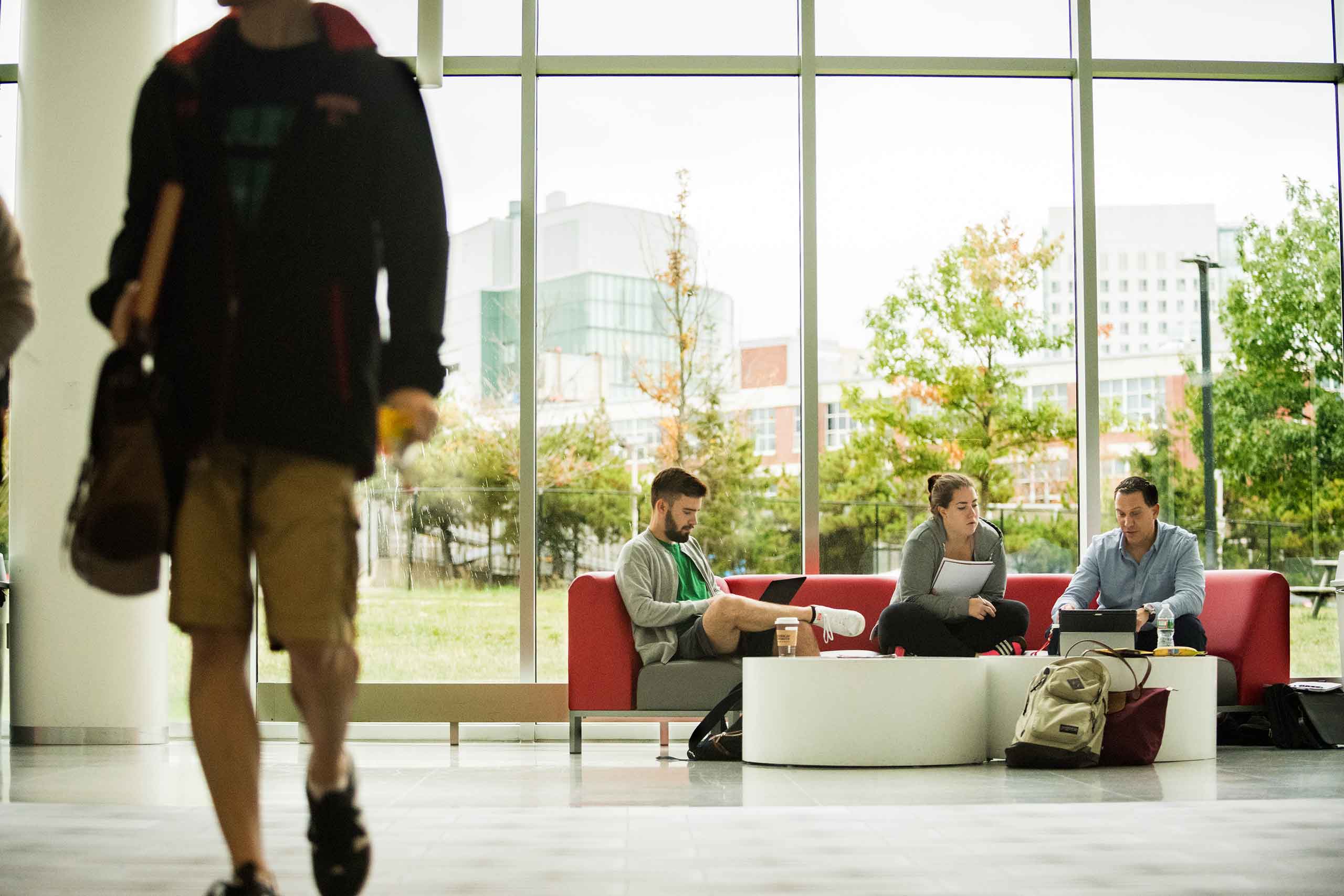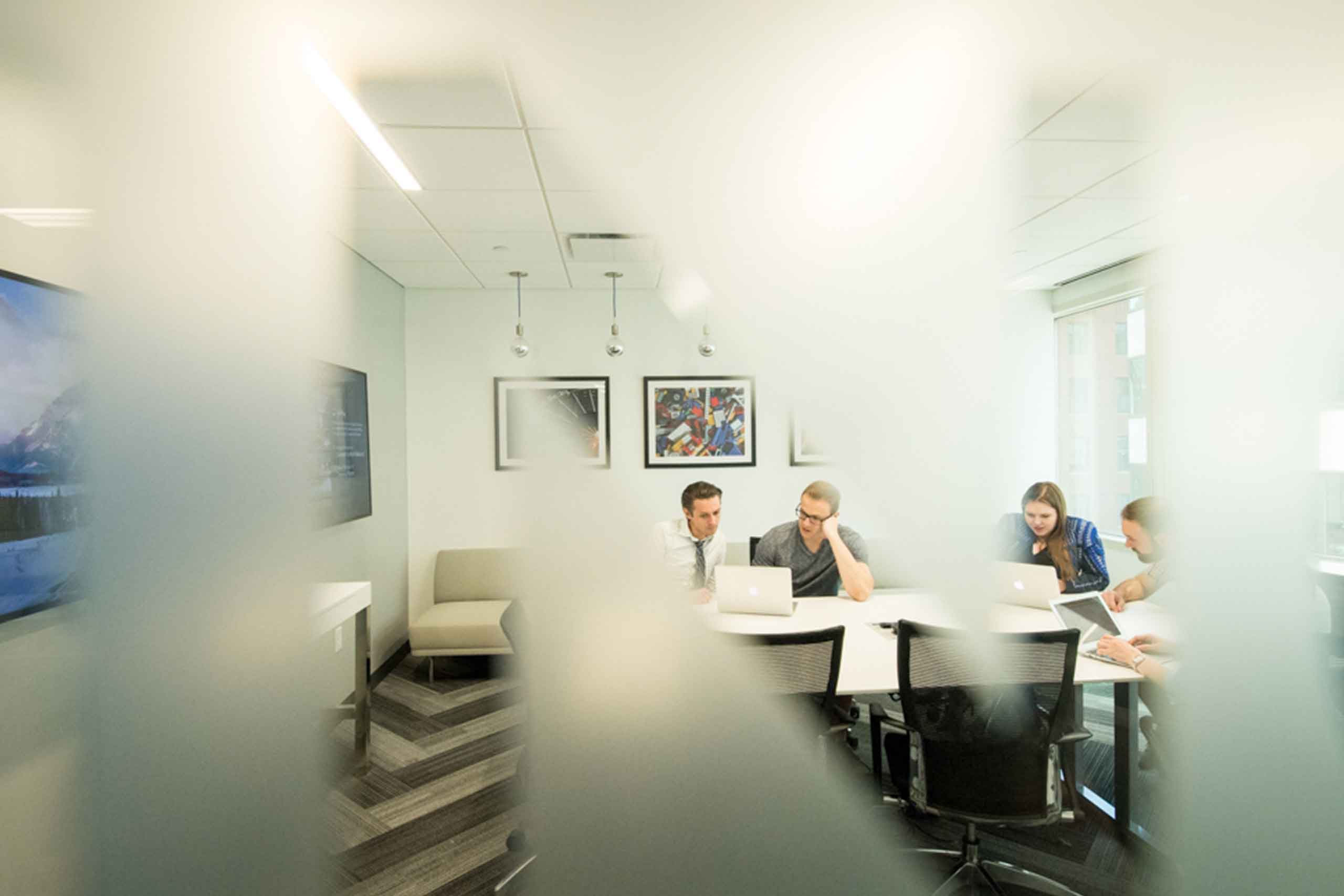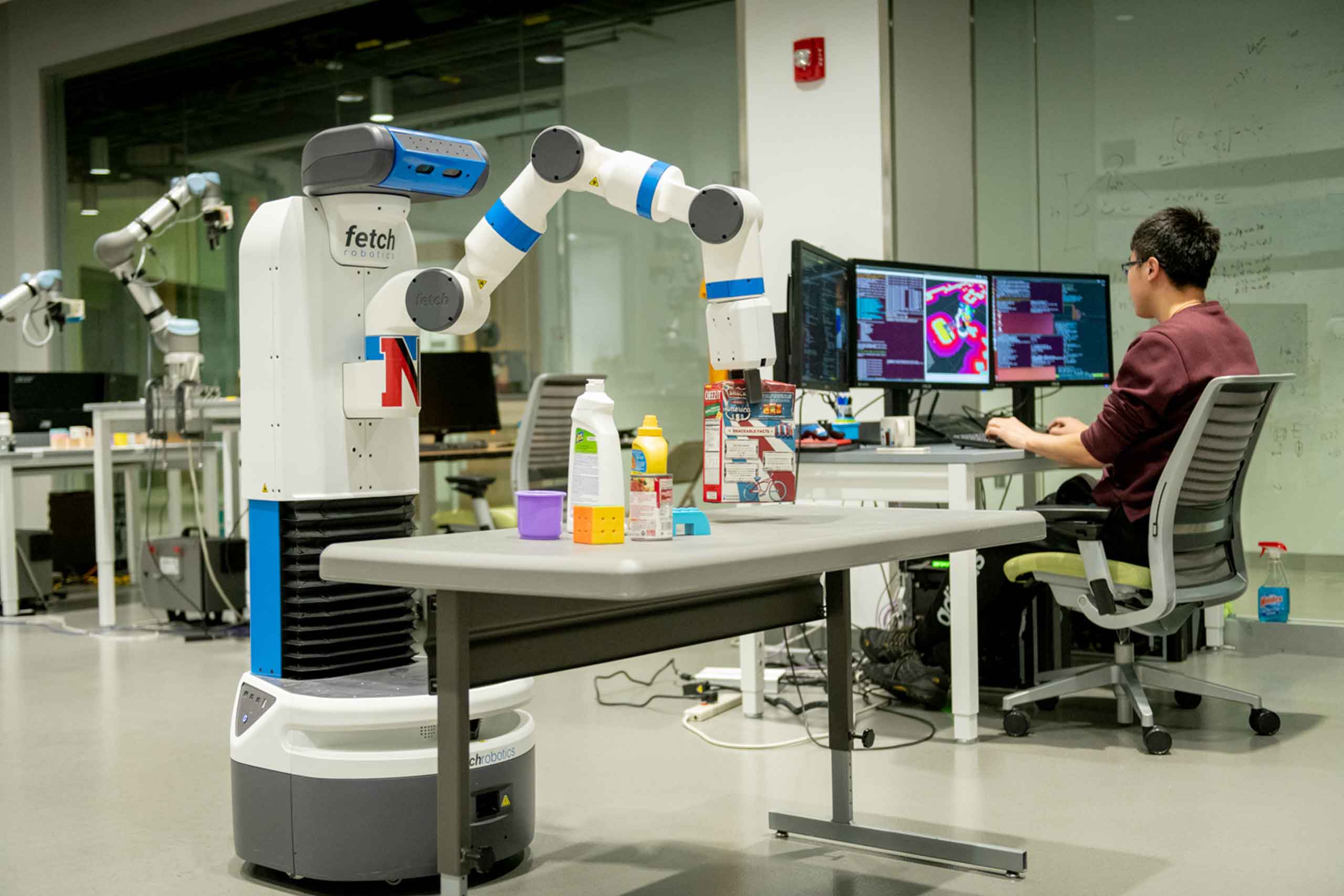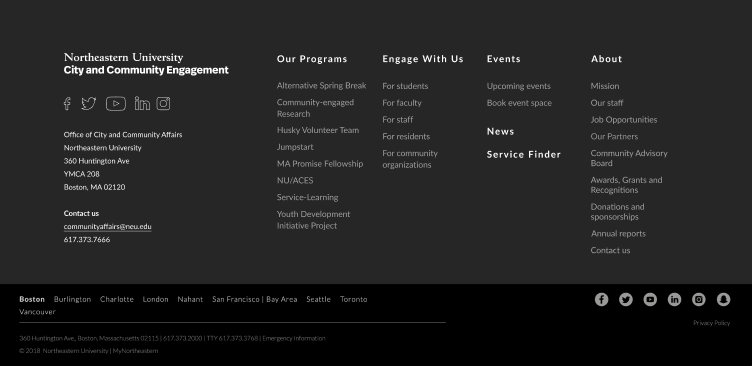

Newcomers to computer science, three recent Khoury alums share their unique stories

Fri 07.23.21 / Aditi Peyush

Newcomers to computer science, three recent Khoury alums share their unique stories
Fri 07.23.21 / Aditi Peyush
Fri 07.23.21 / Aditi Peyush
Fri 07.23.21 / Aditi Peyush


Newcomers to computer science, three recent Khoury alums share their unique stories

Fri 07.23.21 / Aditi Peyush

Newcomers to computer science, three recent Khoury alums share their unique stories
Fri 07.23.21 / Aditi Peyush
Fri 07.23.21 / Aditi Peyush
Fri 07.23.21 / Aditi Peyush
United by a common goal, to get a degree in computer science, Align students in the Khoury College of Computer Sciences share their journeys. Read about Maochi Li’s background in chemistry and math, and how she landed a software development engineer role at Amazon Web Services. Learn how Alison Bieber’s passion for environmental science translated into her passion to learn more in the computer science field. Finally, check out Nancy Tran’s shift from biostatistics research into the tech industry. Collectively, their stories illustrate the diverse pathways to attaining a master’s in computer science.
Maochi Li
From Chengdu, the capital of the Chinese province of Sichuan, Maochi Li moved to the United States when she was 18 years old.
During her undergraduate career at Northeastern, Li studied chemistry and mathematics, with a pre-med track. She spent two years at the Ondrechen Research Group, under Professor Mary Jo Ondrechen, researching protein functions using computational chemistry and biology approaches. When the team wanted to create a computational method to compute protein functions, they reached out to researchers at Khoury College, who developed tools to analyze the protein function. This sparked a curiosity in Li to understand how those tools were created.
After completing her degree, she originally had plans to apply to medical school; however, reflecting on her time in the lab, she chose to pursue a master’s in computer science. This seemed like a natural next step to her, as her minor in mathematics required her to take foundational computer science courses—in one, she learned Java.
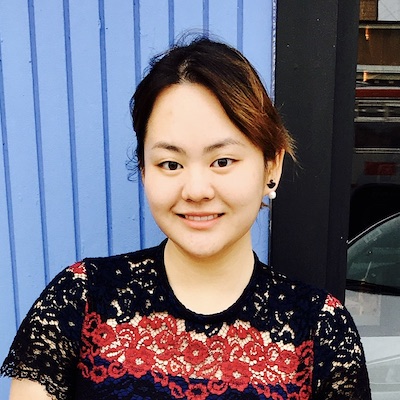 Maochi Li (Align MSCS ’20)
Maochi Li (Align MSCS ’20)Concerned about her limited knowledge of computer science, Li spoke to Khoury College advisors who explained the bridge courses in the Align program. She decided to apply, saying, “What’s special about Align is that they specifically target students who are not computer science majors during undergrad, so they help us fill the gap.”
After gaining admission into the Align program, Li moved from Boston to Seattle in January 2018. She was immediately impressed by the structure of the program, characterizing the schedule as “very systematic.” She found the Align bridge to be well-designed, elaborating, “The university made the plan for students so you will be ready for the next course and then the actual master’s program – it’s really well planned.”
Li’s peers in the program shaped her experiences, describing the benefits of a diverse cohort: “We’re all from different backgrounds, if someone had experience with computer science before, people are always willing to help and explain things to you during the Align course period.” Transitioning into the master’s courses, she especially appreciated the supportive community, feeling that “It’s definitely going to be a challenging process but your professor, your peers, and your tutors will be there to help you.”
After graduating in May 2020, Li became a software development engineer at Amazon Web Services. Long term, she wants to leverage her tech knowledge using experiences gained during her undergraduate career, saying, “I hope by combining my science background, medical knowledge, and programming skills, I will be able to create something new that can turn seemingly impossible ideas into future groundbreaking technologies.” She also hopes to inspire more and more women to enter the field of computer science and succeed in it.
Allison Bieber
Fascinated with geology, Allison Bieber studied environmental science as an undergraduate at Northeastern University in Boston, saying, “I’ve always been really into the outdoors, nature, and the environment, and it was a field where I wanted to make an impact, it was a natural draw.”
After graduating in 2017, Bieber worked for a year and a half as an environmental scientist, testing water and soil samples. “It was enjoyable, but I wasn’t hitting that big impact that I wanted to make. She said she knew, “What’s going to make an impact today is technology.” When she discovered the Align program through word of mouth, she really liked what the program had to offer. In the fall of 2018, she entered the Align program in Boston.
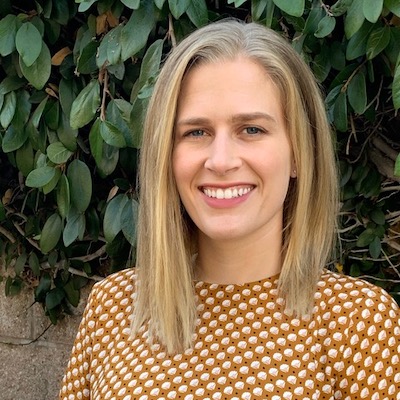 Allison Bieber (Align MSCS ’20)
Allison Bieber (Align MSCS ’20)Upon completing the bridge courses, she was armed with the tools needed to approach the master’s courses. She described the experience as “similarly great, but also a more intimate experience.” She added, “Classes went from 30-50 students to ten students, which was good in a different way.” Bieber also had the opportunity to transfer from the Boston campus to the Bay Area campus, explaining, “My family is still out here so it was really nice to be closer, and there’s so much going on in tech out here.”
Bieber completed her first co-op at Intuit, located in Mountain View, as a full-stack engineer. The co-op was partially remote and in-person. She was able to “learn as much as I possibly could,” and, as the co-op progressed, she shifted towards taking on more responsibility and writing code.
After graduating in December 2020, Bieber reflected on her time in the program, saying, “One thing my master’s showed me is how much there is to learn in tech.” On the impact of the Align program, she said, “What the program did is it set you up really well in an industry that’s fast-moving – there’s so much to learn.”
“A goal of mine is to put myself into positions where I can continue to learn,” she said. Now, at Rivian as a software engineer on the infrastructure team, she’s still in the learning phase, but she explained that working in software infrastructure is like working in dev-ops (a portmanteau of “development” and “operations”), describing it as “The glue that holds all the code together.”
For those considering the Align program, Bieber shared her advice. “I’d say one of the wonderful things about the program – I almost wish I had done – was broaden your expectations in a way. I went in with a cookie-cutter expectation about the types of jobs I wanted to do, but there were so many classes I could have taken that would have broadened my expectations.”
Nancy Tran
Nancy Tran, who is from Seattle with an academic background in biochemistry, loved the problem-solving and experimentation side of her original field. Initially thinking that she would go into the medical field, as an undergraduate she shadowed some doctors in the clinic. She realized, though, “It never really felt quite right for me, and I wasn’t sure if that was the path I wanted to go towards.” Still, her research thesis allowed her to go to national conferences and present her work. “The next natural thing,” she said, “was becoming a research assistant at a research lab, so I came back to Seattle and ended up working at the University of Washington (UW) for two years.”
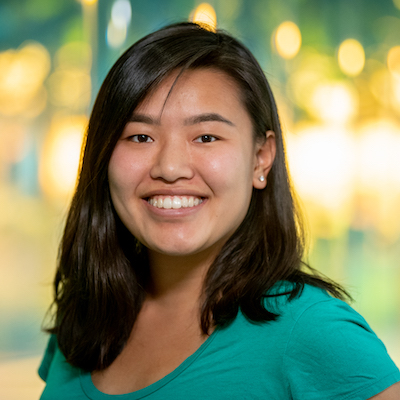 Nancy Tran (Align MSCS ’20)
Nancy Tran (Align MSCS ’20)Her UW position gave her the opportunity to take classes free of charge, and – after a change of heart – she took some in computer science. She explained, “It was something I had never tried — I was always kind of afraid of it. I never pursued it in high school like my friends and then in college my liberal arts college didn’t have a CS program – it wasn’t even a possibility.”
As an alumna of Rainiers Scholars, a Seattle nonprofit that assists low-income students of color through college, Tran has stayed in touch with the organization. In chatting with an administrator, Tran first heard about the Align program. Later, after learning more about the program and touring the campus, she thought, “This seems like it might be a good fit.”
Though Tran considered other programs, she decided on the Align program in Seattle, in part for its well-designed curriculum sequence. She said, “I knew I wanted to delve more in-depth into computer science, and I thought that if I spent more time to ramp up, I would get more from it in my career in the long term.” Upon entering in 2018, she enjoyed the bridge courses, explaining, “It feels like you are in a small cohort where you can make good friends to go through the program with.”
During her time in the program, Tran organized a few women in technology discussion groups, and she also served so much as a teaching assistant that she began assisting with the trainings. In addition, Tran is a Khoury College recruitment ambassador who has helped with developing student interest in the Roux Institute.
In early 2020, she interned at Facebook. Initially, it was difficult to navigate the inner workings of the company, but she drew from her coursework and learning experiences. Tran said, “The biggest pro about taking the Align courses is that I felt I was learning new things in each class I took, so the internship felt like another class – it felt like a more advanced class.”
On working and learning remotely, Tran mentioned it was difficult but possible after a little trial and error. “For me, I found that it’s good to set work hours and space to make sure I’m focused,” she said. Tran also mentioned the importance of asking questions, “Sometimes it might feel like a hassle to message someone for help when you’re working, but your teammates are there for you!”
Tran graduated with her master’s in computer science in 2020. She received a full-time offer from Facebook, where she now works as a software engineer. Engaged in her work, she said she is focused on the present moment: “I’m trying to learn a lot and build skills – I want to learn a lot and be a better software engineer.”
United by a common goal, to get a degree in computer science, Align students in the Khoury College of Computer Sciences share their journeys. Read about Maochi Li’s background in chemistry and math, and how she landed a software development engineer role at Amazon Web Services. Learn how Alison Bieber’s passion for environmental science translated into her passion to learn more in the computer science field. Finally, check out Nancy Tran’s shift from biostatistics research into the tech industry. Collectively, their stories illustrate the diverse pathways to attaining a master’s in computer science.
Maochi Li
From Chengdu, the capital of the Chinese province of Sichuan, Maochi Li moved to the United States when she was 18 years old.
During her undergraduate career at Northeastern, Li studied chemistry and mathematics, with a pre-med track. She spent two years at the Ondrechen Research Group, under Professor Mary Jo Ondrechen, researching protein functions using computational chemistry and biology approaches. When the team wanted to create a computational method to compute protein functions, they reached out to researchers at Khoury College, who developed tools to analyze the protein function. This sparked a curiosity in Li to understand how those tools were created.
After completing her degree, she originally had plans to apply to medical school; however, reflecting on her time in the lab, she chose to pursue a master’s in computer science. This seemed like a natural next step to her, as her minor in mathematics required her to take foundational computer science courses—in one, she learned Java.
 Maochi Li (Align MSCS ’20)
Maochi Li (Align MSCS ’20)Concerned about her limited knowledge of computer science, Li spoke to Khoury College advisors who explained the bridge courses in the Align program. She decided to apply, saying, “What’s special about Align is that they specifically target students who are not computer science majors during undergrad, so they help us fill the gap.”
After gaining admission into the Align program, Li moved from Boston to Seattle in January 2018. She was immediately impressed by the structure of the program, characterizing the schedule as “very systematic.” She found the Align bridge to be well-designed, elaborating, “The university made the plan for students so you will be ready for the next course and then the actual master’s program – it’s really well planned.”
Li’s peers in the program shaped her experiences, describing the benefits of a diverse cohort: “We’re all from different backgrounds, if someone had experience with computer science before, people are always willing to help and explain things to you during the Align course period.” Transitioning into the master’s courses, she especially appreciated the supportive community, feeling that “It’s definitely going to be a challenging process but your professor, your peers, and your tutors will be there to help you.”
After graduating in May 2020, Li became a software development engineer at Amazon Web Services. Long term, she wants to leverage her tech knowledge using experiences gained during her undergraduate career, saying, “I hope by combining my science background, medical knowledge, and programming skills, I will be able to create something new that can turn seemingly impossible ideas into future groundbreaking technologies.” She also hopes to inspire more and more women to enter the field of computer science and succeed in it.
Allison Bieber
Fascinated with geology, Allison Bieber studied environmental science as an undergraduate at Northeastern University in Boston, saying, “I’ve always been really into the outdoors, nature, and the environment, and it was a field where I wanted to make an impact, it was a natural draw.”
After graduating in 2017, Bieber worked for a year and a half as an environmental scientist, testing water and soil samples. “It was enjoyable, but I wasn’t hitting that big impact that I wanted to make. She said she knew, “What’s going to make an impact today is technology.” When she discovered the Align program through word of mouth, she really liked what the program had to offer. In the fall of 2018, she entered the Align program in Boston.
 Allison Bieber (Align MSCS ’20)
Allison Bieber (Align MSCS ’20)Upon completing the bridge courses, she was armed with the tools needed to approach the master’s courses. She described the experience as “similarly great, but also a more intimate experience.” She added, “Classes went from 30-50 students to ten students, which was good in a different way.” Bieber also had the opportunity to transfer from the Boston campus to the Bay Area campus, explaining, “My family is still out here so it was really nice to be closer, and there’s so much going on in tech out here.”
Bieber completed her first co-op at Intuit, located in Mountain View, as a full-stack engineer. The co-op was partially remote and in-person. She was able to “learn as much as I possibly could,” and, as the co-op progressed, she shifted towards taking on more responsibility and writing code.
After graduating in December 2020, Bieber reflected on her time in the program, saying, “One thing my master’s showed me is how much there is to learn in tech.” On the impact of the Align program, she said, “What the program did is it set you up really well in an industry that’s fast-moving – there’s so much to learn.”
“A goal of mine is to put myself into positions where I can continue to learn,” she said. Now, at Rivian as a software engineer on the infrastructure team, she’s still in the learning phase, but she explained that working in software infrastructure is like working in dev-ops (a portmanteau of “development” and “operations”), describing it as “The glue that holds all the code together.”
For those considering the Align program, Bieber shared her advice. “I’d say one of the wonderful things about the program – I almost wish I had done – was broaden your expectations in a way. I went in with a cookie-cutter expectation about the types of jobs I wanted to do, but there were so many classes I could have taken that would have broadened my expectations.”
Nancy Tran
Nancy Tran, who is from Seattle with an academic background in biochemistry, loved the problem-solving and experimentation side of her original field. Initially thinking that she would go into the medical field, as an undergraduate she shadowed some doctors in the clinic. She realized, though, “It never really felt quite right for me, and I wasn’t sure if that was the path I wanted to go towards.” Still, her research thesis allowed her to go to national conferences and present her work. “The next natural thing,” she said, “was becoming a research assistant at a research lab, so I came back to Seattle and ended up working at the University of Washington (UW) for two years.”
 Nancy Tran (Align MSCS ’20)
Nancy Tran (Align MSCS ’20)Her UW position gave her the opportunity to take classes free of charge, and – after a change of heart – she took some in computer science. She explained, “It was something I had never tried — I was always kind of afraid of it. I never pursued it in high school like my friends and then in college my liberal arts college didn’t have a CS program – it wasn’t even a possibility.”
As an alumna of Rainiers Scholars, a Seattle nonprofit that assists low-income students of color through college, Tran has stayed in touch with the organization. In chatting with an administrator, Tran first heard about the Align program. Later, after learning more about the program and touring the campus, she thought, “This seems like it might be a good fit.”
Though Tran considered other programs, she decided on the Align program in Seattle, in part for its well-designed curriculum sequence. She said, “I knew I wanted to delve more in-depth into computer science, and I thought that if I spent more time to ramp up, I would get more from it in my career in the long term.” Upon entering in 2018, she enjoyed the bridge courses, explaining, “It feels like you are in a small cohort where you can make good friends to go through the program with.”
During her time in the program, Tran organized a few women in technology discussion groups, and she also served so much as a teaching assistant that she began assisting with the trainings. In addition, Tran is a Khoury College recruitment ambassador who has helped with developing student interest in the Roux Institute.
In early 2020, she interned at Facebook. Initially, it was difficult to navigate the inner workings of the company, but she drew from her coursework and learning experiences. Tran said, “The biggest pro about taking the Align courses is that I felt I was learning new things in each class I took, so the internship felt like another class – it felt like a more advanced class.”
On working and learning remotely, Tran mentioned it was difficult but possible after a little trial and error. “For me, I found that it’s good to set work hours and space to make sure I’m focused,” she said. Tran also mentioned the importance of asking questions, “Sometimes it might feel like a hassle to message someone for help when you’re working, but your teammates are there for you!”
Tran graduated with her master’s in computer science in 2020. She received a full-time offer from Facebook, where she now works as a software engineer. Engaged in her work, she said she is focused on the present moment: “I’m trying to learn a lot and build skills – I want to learn a lot and be a better software engineer.”
United by a common goal, to get a degree in computer science, Align students in the Khoury College of Computer Sciences share their journeys. Read about Maochi Li’s background in chemistry and math, and how she landed a software development engineer role at Amazon Web Services. Learn how Alison Bieber’s passion for environmental science translated into her passion to learn more in the computer science field. Finally, check out Nancy Tran’s shift from biostatistics research into the tech industry. Collectively, their stories illustrate the diverse pathways to attaining a master’s in computer science.
Maochi Li
From Chengdu, the capital of the Chinese province of Sichuan, Maochi Li moved to the United States when she was 18 years old.
During her undergraduate career at Northeastern, Li studied chemistry and mathematics, with a pre-med track. She spent two years at the Ondrechen Research Group, under Professor Mary Jo Ondrechen, researching protein functions using computational chemistry and biology approaches. When the team wanted to create a computational method to compute protein functions, they reached out to researchers at Khoury College, who developed tools to analyze the protein function. This sparked a curiosity in Li to understand how those tools were created.
After completing her degree, she originally had plans to apply to medical school; however, reflecting on her time in the lab, she chose to pursue a master’s in computer science. This seemed like a natural next step to her, as her minor in mathematics required her to take foundational computer science courses—in one, she learned Java.
 Maochi Li (Align MSCS ’20)
Maochi Li (Align MSCS ’20)Concerned about her limited knowledge of computer science, Li spoke to Khoury College advisors who explained the bridge courses in the Align program. She decided to apply, saying, “What’s special about Align is that they specifically target students who are not computer science majors during undergrad, so they help us fill the gap.”
After gaining admission into the Align program, Li moved from Boston to Seattle in January 2018. She was immediately impressed by the structure of the program, characterizing the schedule as “very systematic.” She found the Align bridge to be well-designed, elaborating, “The university made the plan for students so you will be ready for the next course and then the actual master’s program – it’s really well planned.”
Li’s peers in the program shaped her experiences, describing the benefits of a diverse cohort: “We’re all from different backgrounds, if someone had experience with computer science before, people are always willing to help and explain things to you during the Align course period.” Transitioning into the master’s courses, she especially appreciated the supportive community, feeling that “It’s definitely going to be a challenging process but your professor, your peers, and your tutors will be there to help you.”
After graduating in May 2020, Li became a software development engineer at Amazon Web Services. Long term, she wants to leverage her tech knowledge using experiences gained during her undergraduate career, saying, “I hope by combining my science background, medical knowledge, and programming skills, I will be able to create something new that can turn seemingly impossible ideas into future groundbreaking technologies.” She also hopes to inspire more and more women to enter the field of computer science and succeed in it.
Allison Bieber
Fascinated with geology, Allison Bieber studied environmental science as an undergraduate at Northeastern University in Boston, saying, “I’ve always been really into the outdoors, nature, and the environment, and it was a field where I wanted to make an impact, it was a natural draw.”
After graduating in 2017, Bieber worked for a year and a half as an environmental scientist, testing water and soil samples. “It was enjoyable, but I wasn’t hitting that big impact that I wanted to make. She said she knew, “What’s going to make an impact today is technology.” When she discovered the Align program through word of mouth, she really liked what the program had to offer. In the fall of 2018, she entered the Align program in Boston.
 Allison Bieber (Align MSCS ’20)
Allison Bieber (Align MSCS ’20)Upon completing the bridge courses, she was armed with the tools needed to approach the master’s courses. She described the experience as “similarly great, but also a more intimate experience.” She added, “Classes went from 30-50 students to ten students, which was good in a different way.” Bieber also had the opportunity to transfer from the Boston campus to the Bay Area campus, explaining, “My family is still out here so it was really nice to be closer, and there’s so much going on in tech out here.”
Bieber completed her first co-op at Intuit, located in Mountain View, as a full-stack engineer. The co-op was partially remote and in-person. She was able to “learn as much as I possibly could,” and, as the co-op progressed, she shifted towards taking on more responsibility and writing code.
After graduating in December 2020, Bieber reflected on her time in the program, saying, “One thing my master’s showed me is how much there is to learn in tech.” On the impact of the Align program, she said, “What the program did is it set you up really well in an industry that’s fast-moving – there’s so much to learn.”
“A goal of mine is to put myself into positions where I can continue to learn,” she said. Now, at Rivian as a software engineer on the infrastructure team, she’s still in the learning phase, but she explained that working in software infrastructure is like working in dev-ops (a portmanteau of “development” and “operations”), describing it as “The glue that holds all the code together.”
For those considering the Align program, Bieber shared her advice. “I’d say one of the wonderful things about the program – I almost wish I had done – was broaden your expectations in a way. I went in with a cookie-cutter expectation about the types of jobs I wanted to do, but there were so many classes I could have taken that would have broadened my expectations.”
Nancy Tran
Nancy Tran, who is from Seattle with an academic background in biochemistry, loved the problem-solving and experimentation side of her original field. Initially thinking that she would go into the medical field, as an undergraduate she shadowed some doctors in the clinic. She realized, though, “It never really felt quite right for me, and I wasn’t sure if that was the path I wanted to go towards.” Still, her research thesis allowed her to go to national conferences and present her work. “The next natural thing,” she said, “was becoming a research assistant at a research lab, so I came back to Seattle and ended up working at the University of Washington (UW) for two years.”
 Nancy Tran (Align MSCS ’20)
Nancy Tran (Align MSCS ’20)Her UW position gave her the opportunity to take classes free of charge, and – after a change of heart – she took some in computer science. She explained, “It was something I had never tried — I was always kind of afraid of it. I never pursued it in high school like my friends and then in college my liberal arts college didn’t have a CS program – it wasn’t even a possibility.”
As an alumna of Rainiers Scholars, a Seattle nonprofit that assists low-income students of color through college, Tran has stayed in touch with the organization. In chatting with an administrator, Tran first heard about the Align program. Later, after learning more about the program and touring the campus, she thought, “This seems like it might be a good fit.”
Though Tran considered other programs, she decided on the Align program in Seattle, in part for its well-designed curriculum sequence. She said, “I knew I wanted to delve more in-depth into computer science, and I thought that if I spent more time to ramp up, I would get more from it in my career in the long term.” Upon entering in 2018, she enjoyed the bridge courses, explaining, “It feels like you are in a small cohort where you can make good friends to go through the program with.”
During her time in the program, Tran organized a few women in technology discussion groups, and she also served so much as a teaching assistant that she began assisting with the trainings. In addition, Tran is a Khoury College recruitment ambassador who has helped with developing student interest in the Roux Institute.
In early 2020, she interned at Facebook. Initially, it was difficult to navigate the inner workings of the company, but she drew from her coursework and learning experiences. Tran said, “The biggest pro about taking the Align courses is that I felt I was learning new things in each class I took, so the internship felt like another class – it felt like a more advanced class.”
On working and learning remotely, Tran mentioned it was difficult but possible after a little trial and error. “For me, I found that it’s good to set work hours and space to make sure I’m focused,” she said. Tran also mentioned the importance of asking questions, “Sometimes it might feel like a hassle to message someone for help when you’re working, but your teammates are there for you!”
Tran graduated with her master’s in computer science in 2020. She received a full-time offer from Facebook, where she now works as a software engineer. Engaged in her work, she said she is focused on the present moment: “I’m trying to learn a lot and build skills – I want to learn a lot and be a better software engineer.”
United by a common goal, to get a degree in computer science, Align students in the Khoury College of Computer Sciences share their journeys. Read about Maochi Li’s background in chemistry and math, and how she landed a software development engineer role at Amazon Web Services. Learn how Alison Bieber’s passion for environmental science translated into her passion to learn more in the computer science field. Finally, check out Nancy Tran’s shift from biostatistics research into the tech industry. Collectively, their stories illustrate the diverse pathways to attaining a master’s in computer science.
Maochi Li
From Chengdu, the capital of the Chinese province of Sichuan, Maochi Li moved to the United States when she was 18 years old.
During her undergraduate career at Northeastern, Li studied chemistry and mathematics, with a pre-med track. She spent two years at the Ondrechen Research Group, under Professor Mary Jo Ondrechen, researching protein functions using computational chemistry and biology approaches. When the team wanted to create a computational method to compute protein functions, they reached out to researchers at Khoury College, who developed tools to analyze the protein function. This sparked a curiosity in Li to understand how those tools were created.
After completing her degree, she originally had plans to apply to medical school; however, reflecting on her time in the lab, she chose to pursue a master’s in computer science. This seemed like a natural next step to her, as her minor in mathematics required her to take foundational computer science courses—in one, she learned Java.
 Maochi Li (Align MSCS ’20)
Maochi Li (Align MSCS ’20)Concerned about her limited knowledge of computer science, Li spoke to Khoury College advisors who explained the bridge courses in the Align program. She decided to apply, saying, “What’s special about Align is that they specifically target students who are not computer science majors during undergrad, so they help us fill the gap.”
After gaining admission into the Align program, Li moved from Boston to Seattle in January 2018. She was immediately impressed by the structure of the program, characterizing the schedule as “very systematic.” She found the Align bridge to be well-designed, elaborating, “The university made the plan for students so you will be ready for the next course and then the actual master’s program – it’s really well planned.”
Li’s peers in the program shaped her experiences, describing the benefits of a diverse cohort: “We’re all from different backgrounds, if someone had experience with computer science before, people are always willing to help and explain things to you during the Align course period.” Transitioning into the master’s courses, she especially appreciated the supportive community, feeling that “It’s definitely going to be a challenging process but your professor, your peers, and your tutors will be there to help you.”
After graduating in May 2020, Li became a software development engineer at Amazon Web Services. Long term, she wants to leverage her tech knowledge using experiences gained during her undergraduate career, saying, “I hope by combining my science background, medical knowledge, and programming skills, I will be able to create something new that can turn seemingly impossible ideas into future groundbreaking technologies.” She also hopes to inspire more and more women to enter the field of computer science and succeed in it.
Allison Bieber
Fascinated with geology, Allison Bieber studied environmental science as an undergraduate at Northeastern University in Boston, saying, “I’ve always been really into the outdoors, nature, and the environment, and it was a field where I wanted to make an impact, it was a natural draw.”
After graduating in 2017, Bieber worked for a year and a half as an environmental scientist, testing water and soil samples. “It was enjoyable, but I wasn’t hitting that big impact that I wanted to make. She said she knew, “What’s going to make an impact today is technology.” When she discovered the Align program through word of mouth, she really liked what the program had to offer. In the fall of 2018, she entered the Align program in Boston.
 Allison Bieber (Align MSCS ’20)
Allison Bieber (Align MSCS ’20)Upon completing the bridge courses, she was armed with the tools needed to approach the master’s courses. She described the experience as “similarly great, but also a more intimate experience.” She added, “Classes went from 30-50 students to ten students, which was good in a different way.” Bieber also had the opportunity to transfer from the Boston campus to the Bay Area campus, explaining, “My family is still out here so it was really nice to be closer, and there’s so much going on in tech out here.”
Bieber completed her first co-op at Intuit, located in Mountain View, as a full-stack engineer. The co-op was partially remote and in-person. She was able to “learn as much as I possibly could,” and, as the co-op progressed, she shifted towards taking on more responsibility and writing code.
After graduating in December 2020, Bieber reflected on her time in the program, saying, “One thing my master’s showed me is how much there is to learn in tech.” On the impact of the Align program, she said, “What the program did is it set you up really well in an industry that’s fast-moving – there’s so much to learn.”
“A goal of mine is to put myself into positions where I can continue to learn,” she said. Now, at Rivian as a software engineer on the infrastructure team, she’s still in the learning phase, but she explained that working in software infrastructure is like working in dev-ops (a portmanteau of “development” and “operations”), describing it as “The glue that holds all the code together.”
For those considering the Align program, Bieber shared her advice. “I’d say one of the wonderful things about the program – I almost wish I had done – was broaden your expectations in a way. I went in with a cookie-cutter expectation about the types of jobs I wanted to do, but there were so many classes I could have taken that would have broadened my expectations.”
Nancy Tran
Nancy Tran, who is from Seattle with an academic background in biochemistry, loved the problem-solving and experimentation side of her original field. Initially thinking that she would go into the medical field, as an undergraduate she shadowed some doctors in the clinic. She realized, though, “It never really felt quite right for me, and I wasn’t sure if that was the path I wanted to go towards.” Still, her research thesis allowed her to go to national conferences and present her work. “The next natural thing,” she said, “was becoming a research assistant at a research lab, so I came back to Seattle and ended up working at the University of Washington (UW) for two years.”
 Nancy Tran (Align MSCS ’20)
Nancy Tran (Align MSCS ’20)Her UW position gave her the opportunity to take classes free of charge, and – after a change of heart – she took some in computer science. She explained, “It was something I had never tried — I was always kind of afraid of it. I never pursued it in high school like my friends and then in college my liberal arts college didn’t have a CS program – it wasn’t even a possibility.”
As an alumna of Rainiers Scholars, a Seattle nonprofit that assists low-income students of color through college, Tran has stayed in touch with the organization. In chatting with an administrator, Tran first heard about the Align program. Later, after learning more about the program and touring the campus, she thought, “This seems like it might be a good fit.”
Though Tran considered other programs, she decided on the Align program in Seattle, in part for its well-designed curriculum sequence. She said, “I knew I wanted to delve more in-depth into computer science, and I thought that if I spent more time to ramp up, I would get more from it in my career in the long term.” Upon entering in 2018, she enjoyed the bridge courses, explaining, “It feels like you are in a small cohort where you can make good friends to go through the program with.”
During her time in the program, Tran organized a few women in technology discussion groups, and she also served so much as a teaching assistant that she began assisting with the trainings. In addition, Tran is a Khoury College recruitment ambassador who has helped with developing student interest in the Roux Institute.
In early 2020, she interned at Facebook. Initially, it was difficult to navigate the inner workings of the company, but she drew from her coursework and learning experiences. Tran said, “The biggest pro about taking the Align courses is that I felt I was learning new things in each class I took, so the internship felt like another class – it felt like a more advanced class.”
On working and learning remotely, Tran mentioned it was difficult but possible after a little trial and error. “For me, I found that it’s good to set work hours and space to make sure I’m focused,” she said. Tran also mentioned the importance of asking questions, “Sometimes it might feel like a hassle to message someone for help when you’re working, but your teammates are there for you!”
Tran graduated with her master’s in computer science in 2020. She received a full-time offer from Facebook, where she now works as a software engineer. Engaged in her work, she said she is focused on the present moment: “I’m trying to learn a lot and build skills – I want to learn a lot and be a better software engineer.”

